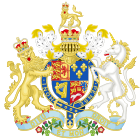- Charter Act of 1793
-
East India Company Act, 1793[1]
(Charter Act of 1793)
Parliament of Great BritainLong title An Act for continuing in the East India Company for a further Term the Possession of the British Territories in India, together with their exclusive Trade under certain Limitations; for establishing further Regulations for the Government of the said Territories, and the better Administration of Justice within the same; for appropriating to certain Uses the Revenues and Profits of the said Company, and for making Provision for the good Order and Government of the Towns of Calcutta, Madras, and Bombay Statute book chapter 33 Geo. 3 c. 52 Other legislation Repealing legislation Government of India Act 1915 Status: Repealed The Charter Act of 1793 was an Act of the Parliament of Great Britain which renewed the charter issued to the British East India Company, and continued the Company's rule in India.
In contrast with legislation concerning British India proposed in the preceding two decades, the 1793 Act "passed with minimal trouble".[2] The Act made only fairly minimal changes to either the system of government in India or British oversight of the Company's activities. Most importantly, the Company's trade monopoly was continued for a further 20 years. Salaries for the staff and paid members of the Board of Control were also now charged to the Company. Other provisions of the Act included:
- The Governor-General was granted extensive powers over the subordinate presidencies.
- The Governor-General's power of over-ruling his council was affirmed, and extended over the Governors of the subordinate presidencies.
- Senior officials were forbidden from leaving India without permission.
- Royal approval was mandated for the appointment of the Governor-General, the governors, and the Commander-in-Chief.
The Company's charter was next renewed by the Charter Act of 1813.
References
- ^ Short title as conferred by the Short Titles Act 1896, s. 1; the modern convention for the citation of short titles omits the comma after the word "Act".
- ^ A Constitutional History of India 1600–1935, Arthur Berriedale Keith, Methuen, London, 1936, p. 100
Categories:- Great Britain Acts of Parliament 1793
- 1793 in Great Britain
- 1793 in India
- Acts of the Parliament of Great Britain
- British rule in India
- British East India Company
- Indian history stubs
Wikimedia Foundation. 2010.
